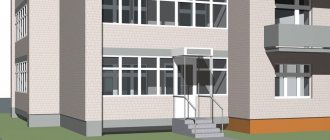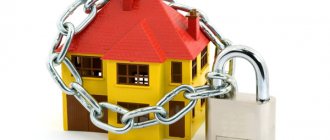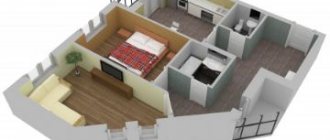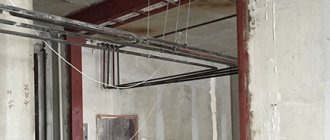Individual input matching
Approval of a separate entrance to the residential premises is carried out when transferring the apartment to non-residential use. You can obtain approval for the entrance to non-residential premises in a residential building through the Order. Approval of a separate entrance + to non-residential premises is carried out at the Moscow Housing Inspectorate, which, upon review of the documents, issues permission to install a separate entrance. The package of documents submitted to the Moscow Housing Inspectorate includes an application from the owner, a project for changing the device of a separate entrance, a technical conclusion, as well as a conclusion from the SES.
Approval of the entrance to a non-residential premises is a very individual and complex procedure due to the many subtleties that you will have to deal with. The installation of a separate entrance in an apartment building requires such measures as the installation of steps, the approval of a canopy over the entrance, and the installation of an entrance platform. The dimensions of the entrance area are important; you need to understand that the entrance group should not be located on common building communications, thereby complicating their maintenance, and the architectural component is also important, because in order to successfully legitimize a separate entrance, it must fit into the appearance of the house. A prerequisite for successfully approving a separate entrance to a non-residential premises is to obtain the minutes of the general meeting of all owners of a residential building. These are just some of the general issues that will need to be addressed during the approval of a separate entrance.
A separate, infrequent type of approval is the approval of a separate entrance to a residential premises. A separate entrance may be required if a disabled person with musculoskeletal disorders (in particular, wheelchair users) lives in an apartment. For such cases, in residential premises on the ground floor, it is possible to agree on the installation of a ramp for unhindered access to the apartment from the street.
Installing separate inputs is a labor-intensive process that is best left to professionals to be sure of the final result.
Owners of non-residential premises in an apartment building
Advice from lawyers:
1. Are owners of non-residential premises of apartment buildings obliged to pay for major repairs?
1.1. Hello! Even if the premises are non-residential, the owner is also obliged to pay contributions for major repairs of the common property of the apartment building.
Did the answer help you?YesNo
1.2. ☼ Hello, If the premises are located in an apartment building, then the owner of the premises is obliged to pay a fee for major repairs. I wish you good luck and all the best!
Did the answer help you?YesNo
Consultation on your issue
8
Calls from landlines and mobiles are free throughout Russia
2. How to force owners of non-residential premises in apartment buildings to pay for major repairs.
2.1. How to force owners of non-residential premises in an apartment building to pay for major repairs. File claims with the magistrate and collect through the bailiff.
Did the answer help you?YesNo
2.2. Go to court and collect. Pay contributions to the cap. repair is the responsibility of the owners of residential/non-residential premises of apartment buildings. Civil Code of the Russian Federation Article 249. Expenses for the maintenance of property in shared ownership “” Each participant in shared ownership is obliged, in proportion to his share, to participate in the payment of taxes, fees and other payments on the common property, as well as in the costs of its maintenance and preservation.
Did the answer help you?YesNo
3. In the microdistrict, non-residential premises belong to the city. Is it possible to return it to the owners?
3.1. Hello! Perhaps, but only through the privatization of this non-residential premises. The owners need to contact the municipality.
Did the answer help you?YesNo
4. Should the owner of non-residential premises pay for the maintenance of elevators if he does not use them and has a separate entrance on the ground floor, where there are no elevators? The same applies to VDGO maintenance if there is no gas equipment in the room, cold water, or electricity. energy and drainage for the purpose of maintaining the common property of the apartment building.
4.1. — Hello dear site visitor, yes EVERYONE MUST pay for the elevator! As for everything else. Don’t you have both stoves and speakers? Good luck to you and all the best, with respect, lawyer Legostaeva A.V.
Did the answer help you?YesNo
4.2. Good afternoon As I understand it, the premises are located in an apartment building. In answer to your question, I’ll say right away that it should. The fact is that the Housing Code in Chapter 6 “COMMON PROPERTY OF PREMISES OWNERS IN AN APARTMENT BUILDING. GENERAL MEETING OF SUCH OWNERS” does not distinguish between the owners of residential and non-residential premises; this chapter specifies the rights and obligations of the owners of PREMISES in the house, regardless of whether they are residential or not. Thus, you are obliged to make payments for the maintenance of common property (be it an elevator, maintenance of entrances, local area, etc.) in accordance with your share in the common property of the owners of the premises. Although, I will add on my own behalf, I agree that paying for an elevator to residents and other owners of premises located on the ground floor, on the one hand, is not entirely fair, but we must take into account that people can also visit friends on the 18th floor, i.e. e. use the elevator. Hence the lack of differentiation in responsibilities for maintaining common property.
Did the answer help you?YesNo
5. What law regulates the payment for utility services of owners of non-residential premises NOT located in an apartment building?
5.1. Hello, Polina! Payment for utilities in private houses and in residential buildings not located in M is also regulated by the following regulations: 1 Housing Code of the Russian Federation. 2 Rules for the provision of utility services to owners and users of premises in apartment buildings and residential buildings, approved by Decree of the Government of the Russian Federation No. 354 of May 6, 2011 (briefly - Rules No. 354). All owners and tenants of residential premises should know these regulations, but, unfortunately, many are too lazy to get acquainted with them. Good luck to you.
Did the answer help you?YesNo
5.2. Hello. Personal consultation.
Did the answer help you?YesNo
6. I am the owner of a non-residential premises in an apartment building, on March 10, 2020, the deadline for checking the cold water meter expired, on July 15, 2020, for May we received bills for 20 thousand by calculation method, do we fall under the Government Decree of April 2, 2020, during this period was in self-isolation because I have bronchopulmonary diseases, I wrote a complaint to the water utility, they threaten to turn off the water supply, if the amount is not paid, are their actions legal and can they really turn off the water.
6.1. No, you don't get it. 1. Clause 5 of the Decree of the Government of the Russian Federation dated April 2, 2020 N 424 “On the specifics of providing utility services to owners and users of premises in apartment buildings and residential buildings”: Suspend until January 1, 2021 the collection of penalties (fines, penalties) in case of untimely and ( or) paid not in full amount of payment for housing
premises and utilities and contributions for major repairs. 2. Vodokanal has the right to suspend the supply of the resource. Good luck.
Did the answer help you?YesNo
7. The tenant leased non-residential premises for a small bakery, having carried out additional work and installed a ventilation and air intake on the roof, at the level of the second floor. There is no agreement with the owners of the apartment buildings. What articles of the Housing Code and SNiP were violated by the tenant when setting up a mini-bakery in the rented premises?
7.1. Here the main thing is broken. He must have had permission from the management company and a decision from the general meeting of owners. Sincerely.
Did the answer help you?YesNo
8. I am the owner of a non-residential premises in an apartment building, there is a separate entrance. Am I required to pay for the maintenance of an entrance that I don’t use?
8.1. No, you are not required to pay.
Did the answer help you?YesNo
9. There is MED common property (CHP) of which is not divided into shares and is not distributed among the apartment owners. In this house, non-residential premises are allocated on a lease basis. The agreement was signed between the individual entrepreneur and the Municipality. From this it turns out that THEY of this house belong to the Municipality. Is it so?
9.1. OH belongs to the owners of premises in the apartment building on the basis of Art. 36 of the Housing Code of the Russian Federation on the right of common shared ownership.
Did the answer help you?YesNo
10. There is a non-residential premises on the ground floor of an apartment building. For some reason, the entrance to this room faces the courtyard. The yard is closed, by decision of the owners, a gate has been installed. The owner demanded the key to the gate and set up a “passage yard.” The yard is small, there are very few parking spaces. He parks all his “guests” there. The question is: is it legal to move the entrance to the residential part (yard), is the requirement for entry legal?
10.1. Good afternoon The installation of fences around the Moscow Ring Road is carried out only by decision of the general meeting of owners (2/3 votes), provided that the land plot is registered in the cadastral register. Such actions should not lead to restrictions on the use of public lands by citizens, as well as to restrictions on the access of emergency services (emergency medical services, emergency services of the Russian Ministry of Emergency Situations, fire service) and specialized services (emergency brigades of engineering services) to the local area.
Did the answer help you?YesNo
11. I am the owner of a non-residential premises on the 1st floor. apartment building. Separate agreements have been concluded with all resource supply organizations. Am I obligated to enter into an agreement with the management company? And if so, what are the consequences of not concluding an agreement with the management company?
11.1. No. No obligation. According to PP (Government Decree) of the Russian Federation No. 354, owners of non-residential premises are required to enter into contracts for the provision of utility services directly with the RSO, and not with the management organization or HOA. The rules for the provision of utility services in apartment buildings and residential buildings were approved by RF Government Decree No. 354. By Decree of the Government of the Russian Federation of December 26, 2016 No. 1498, important clarifications and changes were made to these rules, including the obligation of owners of non-residential premises to enter into resource supply agreements directly with the RSO. Paragraph 3 of clause 6 of RF PP No. 354 obliges owners of non-residential premises in apartment buildings, with the exception of owners of parking spaces, to enter into contracts for the supply of utilities directly with RNO from January 1, 2020. In the absence of such a document, the RSO has the right to calculate the volume of consumption of a communal resource on the owner’s premises using the formulas provided for non-contractual consumption (paragraph 5, clause 6 of RF PP No. 354). The role of the building management organization or HOA/housing complex in the process of concluding an agreement for the supply of utility resources to the owners’ non-residential premises is quite simple: they transmit to the RSO information about the owners of non-residential square meters, and the owner is informed of the need to conclude an agreement directly with resource suppliers (paragraph 4, paragraph. 6 RF PP No. 354).
Did the answer help you?YesNo
12. The administration canceled the transfer to non-residential premises. In 2011, I bought non-residential premises (according to ownership documents) on the 1st floor in an apartment building. After 9 years! I find out that the administration canceled the decision on the transfer (the former owner did not provide any documents) and my premises in the housing stock are listed as an apartment! What to do?
12.1. The administration has the right to make decisions. It must be studied in order to give the correct answer.
Did the answer help you?YesNo
13. From a legal point of view, who should install a ramp into a non-residential premises located in an apartment building with a separate entrance? The landlord is the owner of the premises or the Tenant (if there is a pharmacy in the premises). Is it possible to respond in writing?
13.1. Can't tell by what's written. In the general case, the one who arranged this entrance received the appropriate permits for it.
Did the answer help you?YesNo
Consultation on your issue
8
Calls from landlines and mobiles are free throughout Russia
14. I have non-residential premises in a residential apartment building. Connected from all residential building networks. The tariffs for heating, hot and cold water and electricity will be the same as for the owners of residential premises/apartments/
14.1. Lucky! Commercial rates are significantly higher.
Did the answer help you?YesNo
15. Is it possible for the owner of a non-residential premises on the ground floor of a micro-industrial complex to build a storage room under his premises in the basement and use it to install refrigeration equipment for a store located on the ground floor, that is, above the storage room?
15.1. Only with the permission of all MKD owners, because The basement is common property, with rare exceptions. Sincerely.
Did the answer help you?YesNo
16. Which regulations of the Government of the Russian Federation are applicable when limiting the owner of NON-RESIDENTIAL premises in an apartment building in the provision of electrical energy: dated 05/06/2011 No. 354 or dated 05/04/2012 No. 442?
16.1. It depends on the type of activity.
Did the answer help you?YesNo
17. I am the owner of non-residential premises in an apartment building. It is now closed and there are no tenants. Do I have to pay a regional removal operator for waste removal?
17.1. Good afternoon Please contact the State Bureau of Statistics by phone or email [email protected] . Free legal assistance will be provided.
Did the answer help you?YesNo
18. Storerooms were installed in the stairwells of an apartment building, the Ministry of Emergency Situations issued a resolution on an administrative violation against the management company under 20.4 of the Administrative Code, the storerooms are registered as non-residential premises and are owned by the owners of the building. Is it possible to appeal the decision?
18.1. Alexei! You can appeal anything, but without studying the decision you cannot answer about the prospects for considering the complaint. A decision in a case of an administrative offense may be appealed within 10 days from the date of delivery or receipt of a copy of the decision.
Did the answer help you?YesNo
19. I purchased property in an apartment building, the house is rented out, but not all apartments have owners. In this case, is it possible to hold a meeting of residents in order to obtain consent to the privatization of non-residential premises on the floor (there are no communications or other obstacles to this). Or will the tenants who moved in later have the right to refute my right to this property?
19.1. Good evening! Article 44. General meeting of owners of premises in an apartment building 1.1. Persons who have accepted from the developer (the person providing the construction of an apartment building) after issuing permission to put an apartment building into operation premises in this building under a transfer deed or other transfer document, have the right to participate in general meetings of owners of premises in an apartment building and make decisions on issues referred by this Code to the competence of the general meeting of owners of premises in an apartment building, in the manner prescribed by this Code, within a year from the date of issue of permission to put the apartment building into operation. (Part 1.1 introduced by Federal Law dated December 31, 2017 N 485-FZ) Theoretically, it is possible, you need to find out the circle of copyright holders. I think we should start with the developer.
Did the answer help you?YesNo
20. The court of first instance rejected the Plaintiff’s claims regarding the obligation to provide heating to non-residential premises in the mkd. The defendant is the resource supply company with which the Plaintiff has a direct contract and the HOA that services the MK. An examination ordered by the court was carried out. The expert's conclusion is not in favor of the Plaintiff. At the time of the examination, there was miraculously heating. The court, referring to the conclusion, made a decision.
20.1. Hello Gulnara. Filing an appeal will cost from 10,000 rubles. We need to study the decision, the case materials, and write a complaint. And what does your lawyer, the lawyer, do not want to write?
Did the answer help you?YesNo
20.2. Hello, Gulnara! Each lawyer has his own fees. There is enough time until April 12 to file a complaint. For assistance in preparing written procedural documents, please contact the lawyer you have chosen on this website in person (Article 779 of the Civil Code of the Russian Federation). Do you have a court decision in your hands?
Did the answer help you?YesNo
20.3. An examination is just one piece of evidence; one must proceed from the design documentation as to whether there should be heating there, but one must study the court’s decision.
Did the answer help you?YesNo
The manager of the HOA MK company is creating obstacles in connecting electricity to a non-residential property, of which I am the owner.
I am the owner of a non-residential premises in an apartment building, I rent out the premises. There is a catering point in this premises,
A question from the housing and communal services sector. I am the owner of a non-residential premises on the first floor of an apartment building.
As the owner of 1/94 share of non-residential premises in an apartment building (built-in parking)
In an apartment building, the owner owns residential and non-residential premises. In absentee voting, how many ballots will he have,
I have a non-residential premises in an apartment building with a separate entrance.
I have non-residential premises in an apartment building. The HOA does not register the water meters installed in my premises.
We are the owners of non-residential premises in an apartment building. The management company imposes an agreement on the removal, disposal and processing of waste materials. How right are their actions?
The question is this: in our apartment building, the first floor is non-residential premises that are not equipped with individual heat meters...
Two owners own in equal shares 11/40 a non-residential premises located in a residential apartment building on the ground floor.
I am the owner of a non-residential property and have entered into an agreement for fire alarm maintenance.
Organization of a new entrance to non-residential buildings
Approval of a separate entrance to a building in Moscow is not an easy procedure, mostly due to the subjectivity of opinion when considering a project to change the appearance of the facade. First of all, you and the Moscow Architecture Committee may not have the same idea about the beauty of the new entrance being designed. Secondly, of course, before starting work you need to make sure that the new entrance to the building will not affect the structural integrity of the entire building. These points are reflected in the technical report on the possibility of installing a new entrance (link), which is prepared by the engineer after conducting a field survey of the premises. Thus, not all ideas about arranging a separate entrance to a non-residential premises are realistic, and in order to clearly answer the question about the possibility of agreeing on a new entrance to the building, it is better to first consult with professionals.
To summarize, when designing a new entrance in both residential and non-residential premises, it is necessary to take into account the accessibility of the organized entrance for people with limited mobility. An obligatory step will be the approval of the canopy over the entrance to the non-residential premises. The design solution must be in the style of an existing building and not deviate from the general rhythm, otherwise the likelihood of its approval is greatly reduced.







